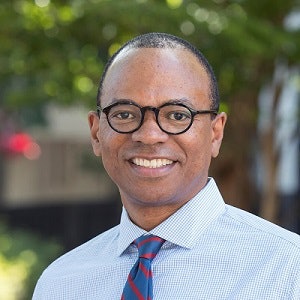 Dr. James Earl Davis
Dr. James Earl DavisEven though Dr. James Earl Davis grew up in the rural South, near Huntsville, Alabama, he has always loved cities.
Now, Davis — a prolific researcher and teacher — uses urban spaces as a platform for his scholarship at Temple University, where he holds the Bernard C. Watson Endowed Chair in Urban Education and is a professor of higher education and educational leadership.
“Always fascinated with ideas,” Davis says, adding that his childhood growing up in the South provided a nurturing environment for him to fall in love with learning. He eventually attended Morehouse College and earned a bachelor’s degree in sociology. While there, Davis found a number of mentors who offered their support and helped to mold his career trajectory.
“I had such caring and engaged faculty and advisors,” says Davis. “It was clear the faculty actually knew my potential and had ambitions for me before I was well aware of those.”
Davis is convinced that his experience at Morehouse “ensconced” his current career pathway as he knew that he wanted to pursue a research agenda. After graduation from Morehouse, he went straight to Cornell University for graduate school, where he situated his studies on social policy and evaluation research.
Following a post-doctoral fellowship in educational policy, Davis became an assistant professor of measurements, statistics and evaluation at the University of Delaware where he remained for almost a decade. He later relocated to Temple University where he began an associate professorship.
“Temple University is in North Philadelphia so the context is really attractive to me,” says Davis. “The city, the urban landscape kind of drew me and then continues to influence my work.”
Davis has taken an interdisciplinary approach to his research, covering a variety of topics within higher education, urban education and gender studies. His research on how schools serve as a context for identity development as well as his scholarship focused on access and equity issues within higher education have caught the attention of other scholars.
His most notable area of research, however, has focused on how gender and race inform students’ achievement and engagement outcomes. He was among the early group of scholars that researched and wrote about the challenges facing young Black men. Though Davis has long moved hundreds of miles away from his hometown, he says that lessons from his childhood have stayed with him across the years.
“In some ways, Philadelphia is a long way from Huntsville but it is a direct path of who I am in lots of ways,” says Davis, who served as the interim dean for Temple’s College of Education for three years and also held visiting teaching positions at Cornell and the University of Michigan. “Interests I developed as a boy, growing up in Alabama, are some of those interests that are still with me. I learned to think about the world in a certain way.”
Now, Davis is mentoring and training the next generation of scholars, working closely with doctoral students and teaching courses in urban education and research methods.
“I think my decision about institutional place has been about the ability of the institution to inspire me to do the work and give me opportunity,” says Davis.
In 2014, Davis was named the Bernard C. Watson Endowed Chair in Urban Education, which was named in honor of the founder of the urban education program at Temple.
“In this role as this chair, it is also a sea of learning given my work in community settings,” says Davis. “I continue to learn what it means to be in collaboration with community and collaboration with your neighbors. So I am privileged every day to hold this seat of honor.”
Earlier this year, Davis became one of 11 American Educational Research Association (AERA) Fellows. Scholars were nominated by their peers based on their contributions to education research, according to AERA’s press release.
With all of his many accomplishments and accolades, Davis says that the biggest challenge is keeping “levelness as an academic and scholar.”
“The challenge is about how you try to avoid the seduction of university spaces that will tell you that you are important, you are smart and you are exceptional,” says Davis. “The challenge is how do you continue to do the work and understand it is not about exceptionality. Your work is only as good as how it informs and transforms.”
Davis considers himself a faculty member at his core and says that he is inspired by the opportunity to work with students.
“I work from this place of passion about the roles of knowledge and research and scholarship to hopefully inform sort of where we are and what we do as educators, activists and social scientists,” says Davis. “Ultimately, I want to have an effect on the next generation of researchers and educators.”
This article appeared in the September 20, 2018 edition of Diverse. This is one in a series of profiles about distinguished professors of education.















